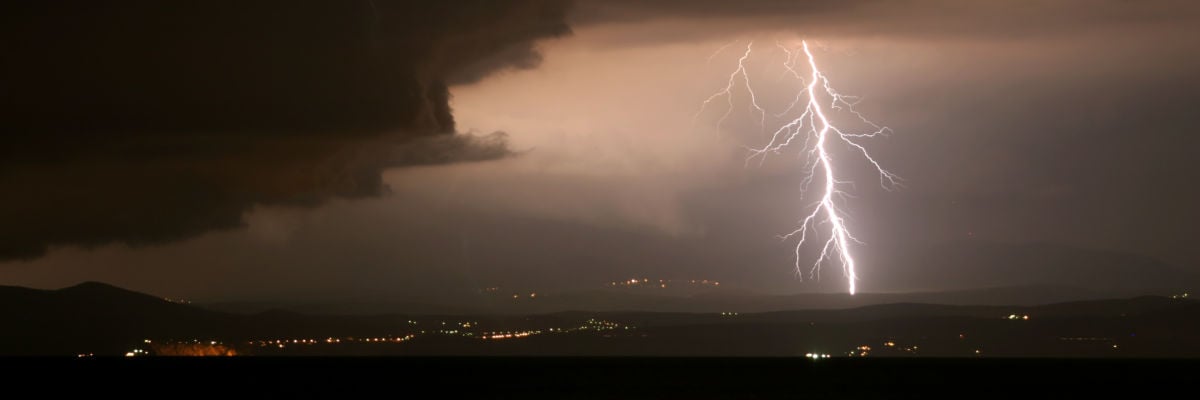
Many years ago, a famous pop star said she left the Catholic faith at age 15 because she couldn’t imagine anybody condemned for an impure thought. Misunderstanding the basics of sin, conversion, and forgiveness, the woman was content mocking God and took pride in gravely sinful behavior. Her life became an open book of debauchery.
Many Catholics—laity, clergy, perhaps the majority of German bishops promoting a change in Church teaching on human sexuality—agree with the pop star. But God’s mercy complements his justice. More than that, each is inseparable from the other. “Steadfast love and faithfulness will meet; righteousness and peace will kiss each other” (Ps. 85:10). Dismissing divine wrath as “poetic” sentimentalizes divine mercy.
We generally accept punishment on terms we understand. Parents discipline their children to correct misbehavior. Society arrests and imprisons criminals. War is a self-inflicted punishment for the solidarity of sin. Violations of natural law upset God’s natural order, and we suffer. “God forgives; men sometimes forgive; but nature never forgives.” This truism reasonably frames much of human suffering and the reasonableness of punishment.
Alternatively, we are often too lenient in administering justice. Many consider righteous punishment a reactionary embarrassment. Modern comforts anesthetize and distort the necessity of punishment, which gives way to sensitivity training, procedures, and workshops “to ensure this-or-that never happens again.” Therapy has its place, but it cannot substitute for the deterrent value of discipline administered justly.
The ancient Romans were methodical in their punishment. They commonly marched on offending vassals, killed the disobedient and rambunctious rulers, handed the keys to the next in line, and warned them not to make the same intransigent mistakes. The promise of a violent return visit multiplied the force of the military intervention, enhancing Roman power (see Force, Power, Strategy: Skillsets for a Second American Century by Richard Vigilante). This is not to say that every form of punishment devised by man is the correct one. But our inclination to punish—and to punish for the purpose of maintaining the natural human order—does not come from an evil place.
God’s wrath is also a force multiplier. It deters evil, restores justice, and enhances his power and majesty. “See now that I, even I, am he, and there is no god beside me; I kill and I make alive; I wound and I heal, and there is none that can deliver out of my hand” (Deut. 32:39). God gives life, and he destroys it. His punishment is terrible but purposeful. He destroyed the world (sparing Noah and his family) because of human wickedness. He extinguished entire armies that threatened the faith of his Chosen People. His agent—Elijah the prophet—slashed the throats of 450 apostate prophets.
Notwithstanding the language of the pandemic, suffering and death are not the ultimate horrors. The brutality of God’s violence, as a warning and a metaphor for eternal punishment, foreshadows the even greater horror of the wages of sin and disobedience to his will. Jesus warns, “I say to you that every one who is angry with his brother shall be liable to judgment; whoever insults his brother shall be liable to the council, and whoever says, ‘You fool!’ shall be liable to the hell of fire” (Matt. 5:22). His words are chilling: “If your eye causes you to sin, pluck it out; it is better for you to enter the kingdom of God with one eye than with two eyes to be thrown into hell, where their worm does not die, and the fire is not quenched” (Mark 9:48).
The parable of the rich man and Lazarus depicts a prosperous man oblivious to Lazarus and his plight. The rich man dies and languishes in hell. In response to his cry for help, Abraham says, “Son, remember that you in your lifetime received your good things, and Lazarus in like manner evil things; but now he is comforted here, and you are in anguish. And besides all this, between us and you a great chasm has been fixed, in order that those who would pass from here to you may not be able, and none may cross from there to us” (Luke 16:25-26). Just as there is the Mystical Body of Christ destined for heaven, there is an alternative immoral universe: hell, “the mystical body of evil.”
But Scripture does not reveal the eternal destiny of those killed by God—neither of those who deserved his wrath nor of the innocents swept up in temporal violence. The wrath of God in the Old Testament prepares the way for the mercy of Jesus the Redeemer, who forgives the repentant and saves us from the eternal fires of hell. Jesus fulfills the prophecies of Isaiah: “Go and tell John what you have seen and heard: the blind receive their sight, the lame walk, lepers are cleansed, and the deaf hear, the dead are raised up, the poor have good news preached to them” (Luke 7:22). But this is merely the beginning of his mercy.
Aside from cleansing the Temple of the moneychangers, Jesus rarely punishes in the Gospels. “God sent the Son into the world, not to condemn the world, but that the world might be saved through him” (John 3:17). Jesus rebukes James and John, the “sons of thunder,” for their eagerness to call down fire from the heavens to destroy their Samaritan enemies (see Luke 9:54-56). Jesus is Isaiah’s “Suffering Servant,” enduring the ignominy of the cross and overcoming sin, suffering, and death in his glorious resurrection. He redeems mankind, saves us from our sins, opens the doors to heaven, and bequeaths the sacraments to sustain us in his grace.
Divine wrath and violence express God’s perfect justice, but as long as we live on this earth, the fullness of the truth thereof will remain beyond our grasp, cloaked in mystery. “For my thoughts are not your thoughts, neither are your ways my ways, says the Lord” (Isa. 55:8). We have no choice but to accept the limits of human reason and heed St. Paul: “God is not mocked, for whatever a man sows, that he will also reap” (Gal. 6:7).
The last book of the Bible, the Apocalypse, prophesies the final chapter of God’s temporal divine wrath. Only divine mercy can explain God’s wrath. The inseparable mercy of Jesus provides the proper perspective for divine justice.
For our salvation, we dare not deny divine justice as too harsh—or, in so doing, downplay the urgent necessity of humbly seeking divine mercy.



